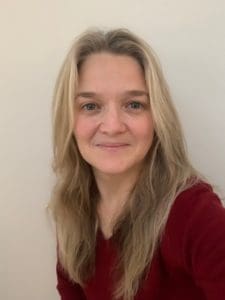People, Peace, and Progress. Member Spotlight: Nicole Grandmont
Nicole Grandmont is a former law enforcement officer, a certified Strategic Intervention Coach and aGender Integration Trainer who has made a transition to mediation. She has a degree in Conflict Studies and is completing her Master’s in education. As a police and gender advisor, she has also worked overseas with NGO’s facilitating community-based conflict resilience programs. She believes in the power of grassroots movements, and advocates for peacebuilding skills to be more highly integrated in our daily lives.
People, Peace, and Progress

Nicole explains that her mantra is “people, peace, and progress,” and that these three things have always been at the center of her personal and professional journeys throughout her life. In her work as a peace officer with the Royal Canadian Mounted Police, she was often exposed to conflict on a daily basis. This led her to believe that there had to be more that could be done to equip law enforcement with specialized skills to assist them in preventing and resolving conflict situations more proactively. Following her career with the RCMP, Nicole was called to lend her expertise as a facilitator and police trainer in Mali, a role that blended her background in law enforcement with her passion for peacebuilding. In support of Global Affairs Canada’s Peace and Stabilization Operations Program, this work allowed Nicole to engage local community members and security forces into dialogue to help build capacity and develop peacebuilding skills through a gender-respective lens. Although she was working in a high-conflict zone, Nicole remained motivated by the determination and consistent level of engagement demonstrated by Mali’s people; and their search to find more effective ways to influence the armed conflict and to achieve sustainable Peace for their country and for their children. This experience opened Nicole’s eyes to the power of human agency and the significant role of grassroots movements on the larger Peace process. It served to pave the way for her to pursue formal education in conflict studies.
A graduate from Saint Paul University in Ottawa and the Dallaire Institute for Children, Peace and Security at Dalhousie University, Nicole also completed her third-party neutral training through the Canadian Institute for Conflict Resolution. This was a pivotal moment for her, as she explains that “the moment I sat down in the course I knew that this was the piece that was missing for me.” The course provided Nicole with the opportunity to hone her practical facilitation and mediation skills, that she could now more articulately leverage in her every day work activities.
Today, she works as a Strategic Policy Advisor with the Canadian Police College, where all of her previous experiences provides her with a better understanding of how to affect policies that will support proper frameworks, enabling the professionalization of policing through advanced and specialized training for practitioners across Canada and internationally. In this role, Nicole continues to apply her knowledge of law enforcement, international issues, and conflict resolution to optimize her outreach with partners and stakeholders and influence her decision-making every day. Ultimately, Nicole says that she believes “in the human story, and I believe in the impact that the human story can have in resolving conflict. Process is important, but human experience and the human story can often tip the scales in driving progress towards a good resolution.” Nicole also continues to work on expanding her own private practice, which introduces animal-assisted activities to facilitate dialogue, promote healing and build conflict resilience with her clients.
MBBI
The international aspect of mediation has always been of interest to Nicole, making MBBI a great opportunity for her to blend her appetite for international projects and mediation. She believes that there is untapped potential to impact more people more often through mediation, but that countries need to enable good legislation and support mechanisms to allow this to happen. As she has witnessed, grassroots approaches are often highly effective, but they can take a long time to progress and the sustainability of these efforts remains a challenge. Nicole believes that organizations like MBBI have the potential to bring legitimacy to mediation as a profession. She says that “the fact that MBBI exists already demonstrates the need for more international attention to be given to mediation as a specialized discipline within the peacebuilding profession.”
Professionalization of Mediation
As a mother of two children, including one with special needs, Nicole has been particularly impacted by the challenges she personally faces in navigating complex education and health care systems. It continues to highlight the toll on society that the prevalence of conflict between individuals, between teams and departments, has on the overall efficiency and capacity of our social systems, not to mention the added frustration, disappointment and duplication of effort for the clients involved.
In an ideal world, Nicole would like to see mediation training as an integral part of formal education, and certainly part of any professional training. Nicole explains that this goal is increasingly becoming a reality, especially with the COVID-19 pandemic “waking people up to the fact that we already have tools. We just need to find more innovative ways to get them to those who need them.” Nicole believes that children should also be taught basic mediation skills in school, as they face conflict in their own lives, including conflict that might have been imposed upon them, and that they may not be equipped to handle. In order for this to become a reality, Nicole feels that we need to become more passionate about the peace process in our daily lives, so that more effort may be put into teaching conflict resolution skills at an early age in school curriculum. This will translate into making a larger scale impact. It will a benefit future generation of leaders and create a more peaceful world.
Article by Tess Hargarten, MBBI Writer
